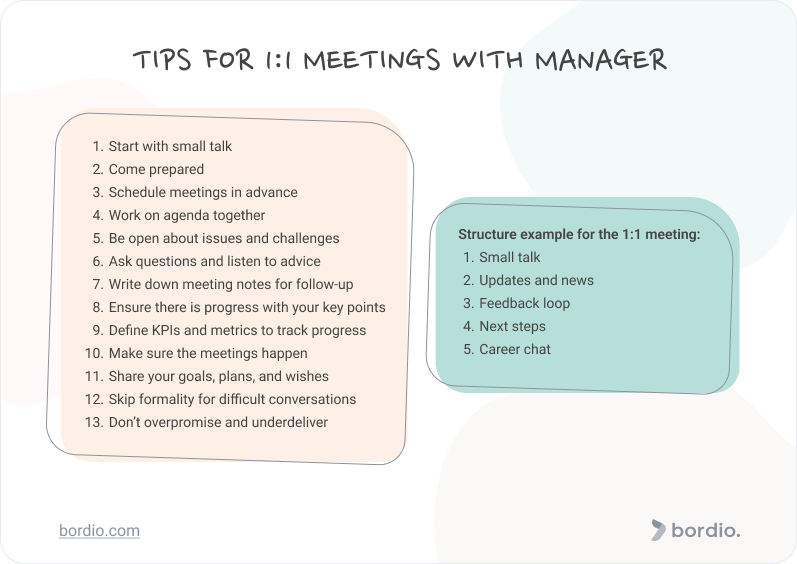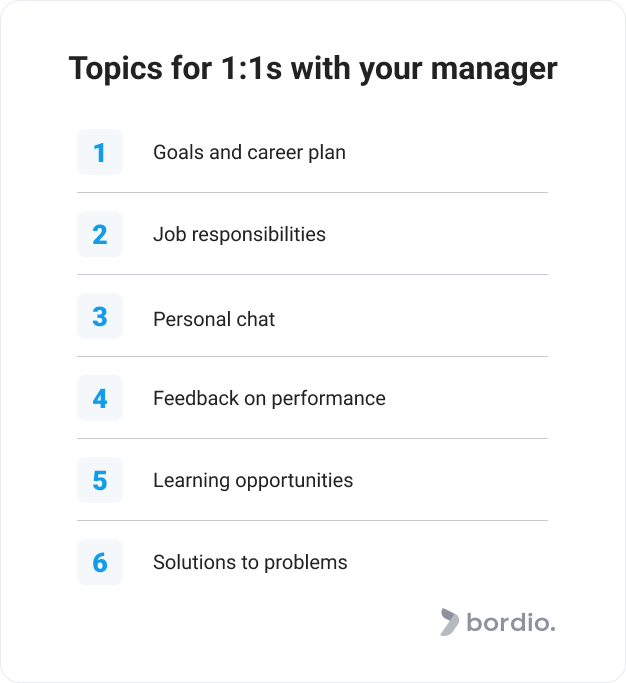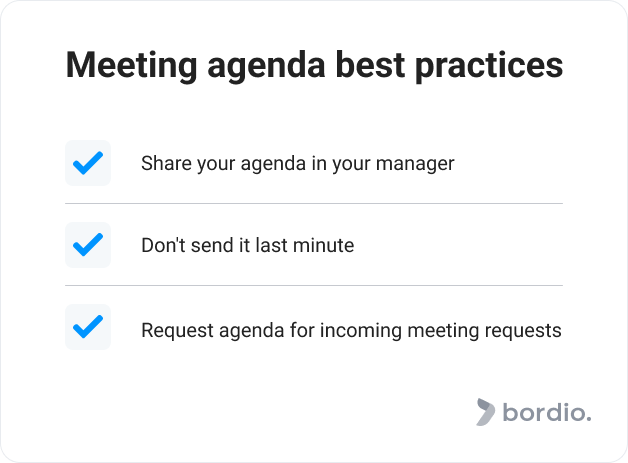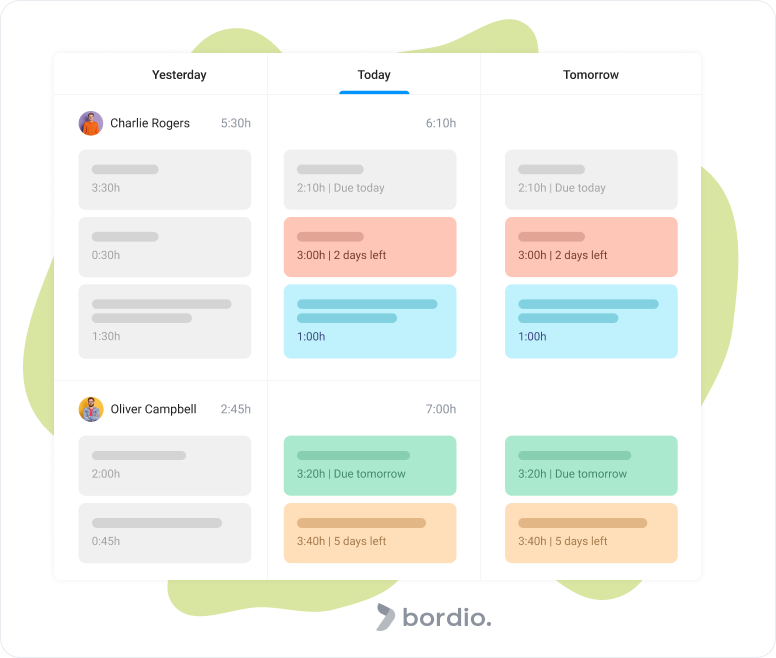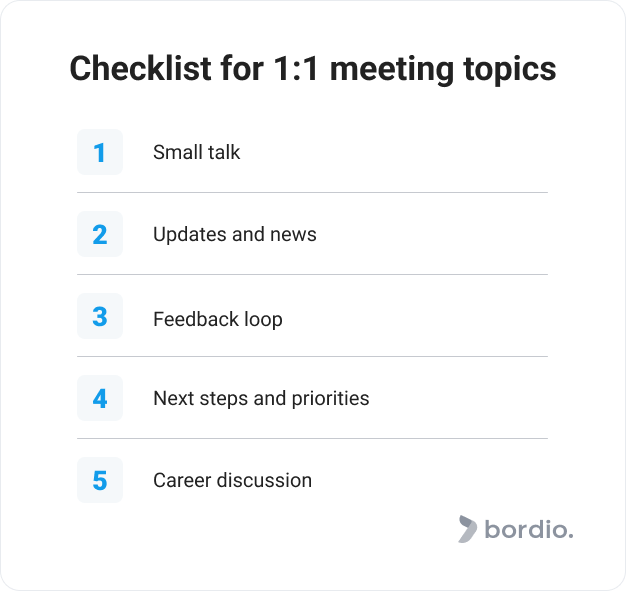Private one-on-one meetings with the manager are powerful tools for an employee to present their ideas, share concerns, negotiate their next career moves, and build a personal rapport.
Many professionals go into one on one meetings with their managers passively, not preparing anything besides the pre-defined meeting agenda and rarely initiating such meetings on their own.
With this article, we want to share the tips and tricks for employees to empower everyone to be proactive and make the most of such unique working tools as one on one meetings with your manager.
Topics to discuss in 1 on 1 meeting with a manager
Scheduling a one-on-one meeting in modern schedule planner with your manager is a great opportunity to catch up on particular cases and resolve various work issues, such as entering into cooperation with saas digital marketing agency.
But 1-on-1 meetings don’t have to always be about putting out a fire. Here are some talking points that you can cover in your upcoming session with your boss:
Professional goals and career development
You might be confident in your career path or have no idea where you’re heading. Either way, there is no better place to touch on your (potential) career goals than a one-on-one meeting with the manager. For example, if you are torn between becoming a project manager and product manager, it’s helpful to get advice from a third-party, even if they’re not an expert in the subject.
Employee’s direct work responsibilities
A one-on-one meeting is a fitting setting to go through your work tasks, such as direct reports that you’d normally just email to your manager. You can run ideas or assumptions by your manager and verify that you are on the right path and that the end products of your work are what the manager is after. Also, it is a perfect time to discuss the current work processes that affect the employee’s daily life. For example, you can suggest switching to a robust online calendar planner to automate certain things, or address the issue of having way too many meetings in your weekly planner to be able to complete important work. For example you can use schedule maker for free by Bordio to automate your planning routine.
Personal chat and deep conversations to build rapport and get closer
You don’t need to become best friends forever, but building a somewhat personal relationship with your manager will improve your working relationship too, making your day-to-day work life more comfortable and pleasant.
Challenges at work you personally face
Your manager’s direct responsibility is to help you excel at your position and remove the roadblocks, so a one-on-one meeting is the best occasion to bring those challenges up.
Constructive feedback on performance
And when we say feedback, we mean both getting and sharing. The feedback you discuss could be about you, your boss themselves, or colleagues. Just remember to keep it constructive no matter how frustrated or excited you are and don’t take it personally.
Learning opportunities for career growth
Learning opportunities come in different shapes and forms. It can be potential mentorships, courses, or conferences. It’s not necessary to work for a huge corporation to be eligible for some kind of educational support from your management. Especially if you see yourself growing within the company.
Solutions to existing company problems
Employees can and should think about the ways they can support their manager.
How can you make the manager’s life easier? Maybe there are tasks on their online to-do list you could take over? If there is a process that could be improved – use one on ones to share your thoughts. It is helpful in career and promotion discussions, as well as new roles and goals perspective. We recommend using simple schedule builder and it will help you to improve the work processes.
Feel free to suggest ideas related to the team’s work. For example, you can find a good option for team building and share it with your manager or suggest implementing teamwork quotes to boost morale and team spirit.
And if you’ve made a mistake, a one-on-one meeting would be the perfect place to discuss it too. We did a whole guide on how to apologize to your boss that you can read to be fully prepared to own your faults.
Final tip: One-on-ones can have any meeting agenda really. Anything is useful to talk about and share if one or both you and your manager benefit from it. But please note that your relationship is a two-way street. So in your future meetings, try to keep your manager’s interests and headaches in mind as you pitch and discuss things that matter to you.
Making your 1 on 1 meeting with a manager a success
Not every meeting is a success, some of them are flops. One of the key reasons why people walk out of a one-on-one meeting feeling dissatisfied is because they didn’t actively try to make the most of it.
What can you do to maximize the benefits of your one-on-one meetings with the boss?
#1 Start with the small talk
You don’t have to do elaborate game-like ice breakers but a short and sweet chat about something neutral will help you both relax a little and start a meeting on a friendlier note.
#2 Come prepared
Think about topics you want to cover and make bullet point notes. That way, you will not only appear professional but will also be able to cover everything you truly want to bring to your manager’s undivided attention.
#3 Schedule meetings in advance
Allow yourself and the manager enough time to prepare. Ad-hoc meetings are fine sometimes, but a one on one requires extra preparation time, otherwise, it’s not as useful. If you can, schedule a recurring meeting in your daily planners and stick to those times and dates. You won’t have to keep all the dates and cases in your head, which will make your memory better with free daily schedule maker.
#4 Work on the agenda together
If you’ve initiated a meeting, share the preliminary agenda with the manager to help them prepare too. If they’re scheduling the session, ask them to share key points with you and send back your additions and suggestions.
Ps – don’t send your agenda 10-20 minutes before the meeting. It’s useless and disrespectful at this point. Make sure there’s enough time for your manager to study and take some action on the points.
#5 Don’t be afraid to discuss issues and challenges
In fact, be open and proactive, and seek to resolve whatever bothers you, your boss, or your team. Even if most errors can be solved by controlling the process through remote collaboration tools, face-to-face discussions are also important.
Nobody likes to talk about issues, and the employees who do that are always in the minority. Yet it sends a powerful message to the manager that you are mature, accountable, and ready to take responsibility. At the same time, don’t be the negative Nancy who always just complains. Think of possible solutions to whatever problems you’ve identified.
#6 Ask questions and learn to listen
Every manager has experience and insight that you can benefit from. If there’s not much you want to discuss in this particular one-on-one meeting, pick whatever your manager brings up and dive deep into those topics.
#7 Write down key points during the meeting and send them to the manager as a follow-up
The manager’s day is filled with meetings, so they barely have time to sit down and contemplate what was discussed with who. Make yourself stand out with thoughtful meeting notes that will remind your manager of the key talking points of your discussion and serve as an extra push to keep you and your ideas at the top of their mind.
Also, next time you meet with your manager, you will have meeting notes from the past week to pick up where you left off.
#8 Make sure those key points you discussed are acted on
Do whatever’s necessary on your end, chase, and follow up with other parties (within reason, naturally) to ensure there is progress with your talking points and agreements from the last one-on-one meeting.
Covering all topics and taking notes is great, but it all fades away if there is no action. Don’t be shy to ping someone on the direct report you’re waiting for, or insist on meeting with the team member who can guide you through an unfamiliar process.
#9 Make sure the meetings happen
If you have a recurring calendar event for one on ones that your boss tends to cancel at the last minute as “there’s nothing to discuss really”, politely ask them to have the meeting or at least agree that the next week’s one is not canceled again. Plan it in advance in simple weekly schedule planner for all team.
One-on-one meetings are important for your professional development, and they need to happen at least semi-regularly.
At the next meeting, bring up this issue and ask if a different frequency or timing would fit your boss better. If you’ve had weekly morning meetings on Monday, maybe it makes sense to transform them into bi-weekly meetings on Thursday afternoon when things are not as crazy. Here weekly schedule maker online will really help.
#10 Always talk about your goals, plans, and wishes
No need to be extra pushy but show assertiveness. Your manager is the key to your career and salary growth, at least within that particular company. You are not winning anything by staying silent about your aspirations.
#11 If you agree on specific steps, think about the metrics to measure progress or milestones/deadlines
It is more professional, shows intention, and will give you an instrument to track how well you are doing. Also, you can use those metrics as a measure to chase your manager gently.
You can use productivity software like Bordio to help you set and track those metrics.
#12 Make it less formal whenever necessary
If you have some sensitive topics to discuss, you might be better off opting for a less formal meeting format, like a walk in the park, a quick trip to the coffee shop, or just a standing meeting like Scrum or Agile practice somewhere on the fresh air. It will be easier to share criticism or constructive feedback, and discuss performance reviews when you are in a more relaxed setting.
#13 Be careful with your promises and ambition
Remember, it’s easy to get carried away and excited when discussing something with your manager one on one. Try to remain realistic – never overpromise and underdeliver.
Question templates for your next one-on-one meeting
Here are different question ideas that you can ask in one-on-one meetings with your manager grouped by topics.
Career development
- Here is the next career move I see for myself. What is your view on that?
- What skills and/or knowledge do I need to gain before progressing with my career?
- What potential career moves are available to me within the following 12 months?
- Where would you see me add the most value to the company?
- Where do you see my role in the next 12-24 months?
- What skills would you recommend I work on?
Teamwork
- How do you see our current cooperation within the team and what can be improved?
- What are the strongest points of our team right now?
- Who do you see as the team leader? Qualities and skills-wise.
- What are your biggest challenges with managing our team members?
Work performance review
- How would you rate my recent performance on a scale from 1 to 5?
- What recommendations do you have to improve employee performance?
- What would like me to focus on next?
- What feedback do you have for me? Both positive and negative.
- How can I approach you for support and guidance when I need help with something?
- What are your key tips for productivity and time management?
- What is something I could be doing that I don’t?
- What is taking up your mind and troubling you that you could delegate to me?
Topics template for your one-on-one meeting with the manager
Here is the checklist of different topic categories that you can go through during your one-on-one meetings:
- Small talk and personal catch-up.
- Updates: performance, achievements, progress on tasks.
- Feedback loop: what do you have to share and what can your manager tell you?
- Next steps and priorities for the week or month.
- Career section: growth potential and current roadblocks.
We hope these question examples and a topic template will be helpful for your one-on-one meetings. Please feel free to use them in your agenda templates and go through them over the course of several sessions.
Final thoughts on 1-on-1 meetings with manager
The main advice we can give you is to be positive, not passive.
Treat one on one meetings as development opportunities and not formal check-ins. One-on-ones with your manager are more than a formality incepted by the head office. They are a powerful instrument that is beneficial for both managers and employees. Try introducing tools like the best online planner and simple task organizer to your team.
Managers can use one on one meetings to track progress on tasks, boost employee engagement, and practice their leadership and mentoring skills. Employees, in turn, can use this platform for self-improvement and self-promotion to make themselves visible and get their point across.

